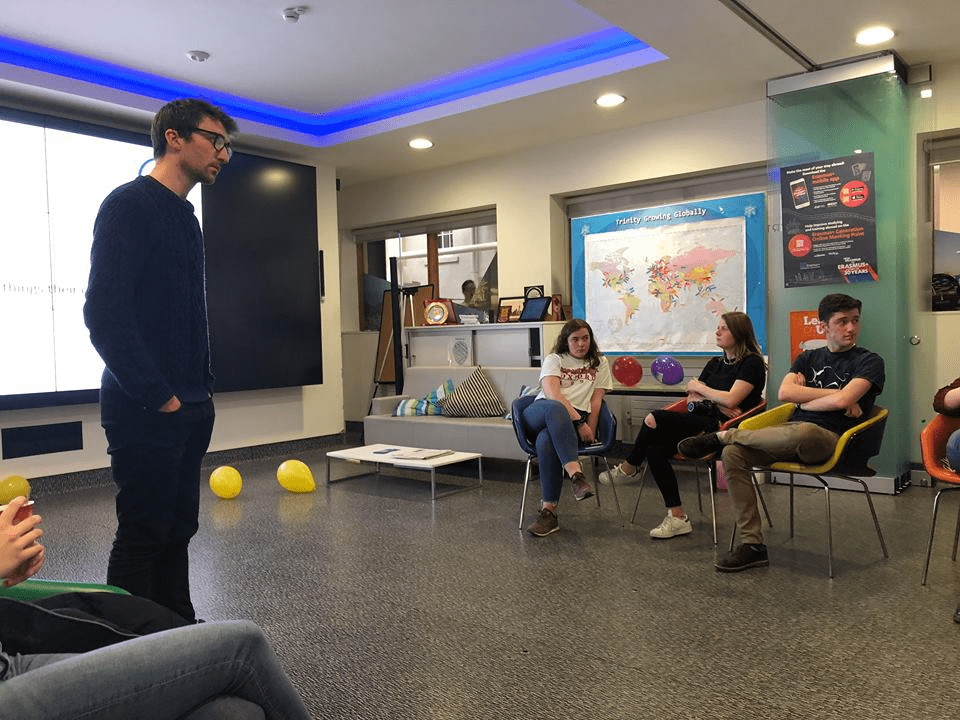Mental health is inarguably one of the greatest struggles of our generation. It can be particularly difficult when you know a friend is going through a tough patch. Should you ask them about their problems? Where do the boundaries lie between friendship and invading one’s personal privacy? What can you do for someone? These are complex, intricate and sometimes challenging questions that are faced.
On Tuesday, in the Global Room, DU Meditation, Niteline, S2S Peer Mentors and TCDSU Welfare came together to offer students guidance on navigating their way through such uncharted waters. “How to Support a Friend” was hosted in conjunction with Trinity’s Body and Soul Week. This week is dedicated especially to the students, encouraging them to embrace themselves wholeheartedly and positively, both physically and mentally.
Speaking on behalf of Niteline, our host Cillian was hilarious, energetic, comprehensive and extremely informative. He eased into the talk by introducing us all to Niteline. Niteline is a helpline offering support to Trinity students every night. It is confidential and anonymous, providing a non-judgemental and non-directive service that anyone can avail of.
Cillian then asked us, if we have a friend in need and we want to offer some support, how much is too much help? We listed off actions such as being too invasive or breaching their trust by telling their secret to someone else. Another huge concern is when you take on their problems as your own; this is something you should never do.
Then we flipped it around and wondered, what then, is too little help for a friend? Never try to upstage them by telling them about your own problems, which to you appear so much worse. Avoid being apathetic, as this can discourage people from sharing their concerns. Someone raised a striking analogy that stuck out: some people might drown in five feet of water, while others may drown in ten feet and some people can’t even swim. What is conceivably manageable for one person may be an astronomical task for another. Everyone deals with their challenges differently, and everyone has varied levels of mental capability and comfort zones. It’s important to respect and remember this.
Body language, we learned, is important. Don’t forget to show interest- always angle your body towards your friend when they are speaking and turn your feet towards them. Eye contact is also crucial, but there was also some witty repartee about how much eye contact was too much. However, there is a fine balance to be struck here. Remember that your main concern is actively listening to your friend; don’t allow your concentration to slip because you’re focusing so much on how your body language will be received.
Your goal is to listen, one hundred percent attentively- active listening. Remember, always pick a safe space to have a conversation, the bustling Arts Block is perhaps not the best place to have a heart-to-heart! se a compact statement, a little affirmation to let them know you are listening, like “that sounds tough”, to remind them you’re always there. on’t forget to remind them of this, let them know you can always lend an ear, even if they aren’t ready to talk just yet. Embrace awkward silences – it’s never okay to force someone to open up to you.
There’s always someone willing to listen, even if your friend doesn’t want to confide in you. Services like Niteline, the S2S Peer Group, the Samaritans and TCD Counselling are always there for you, with trained, skilled people ready and willing to hear you out. Never suffer in silence. I learned a lot today; and the most important thing, among all the laughter and delightful banter, is that there are good people out there who always want to help: your friends.







